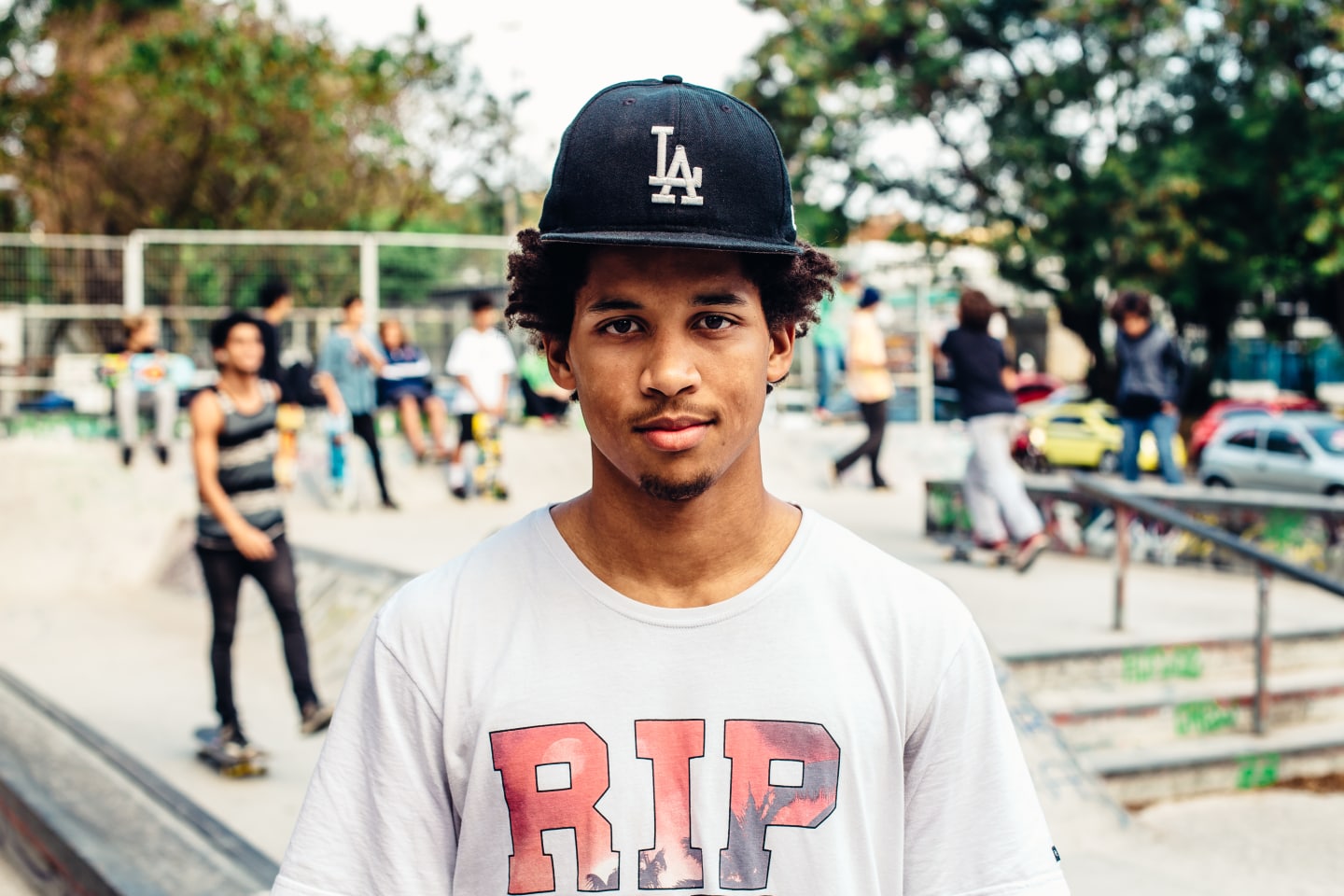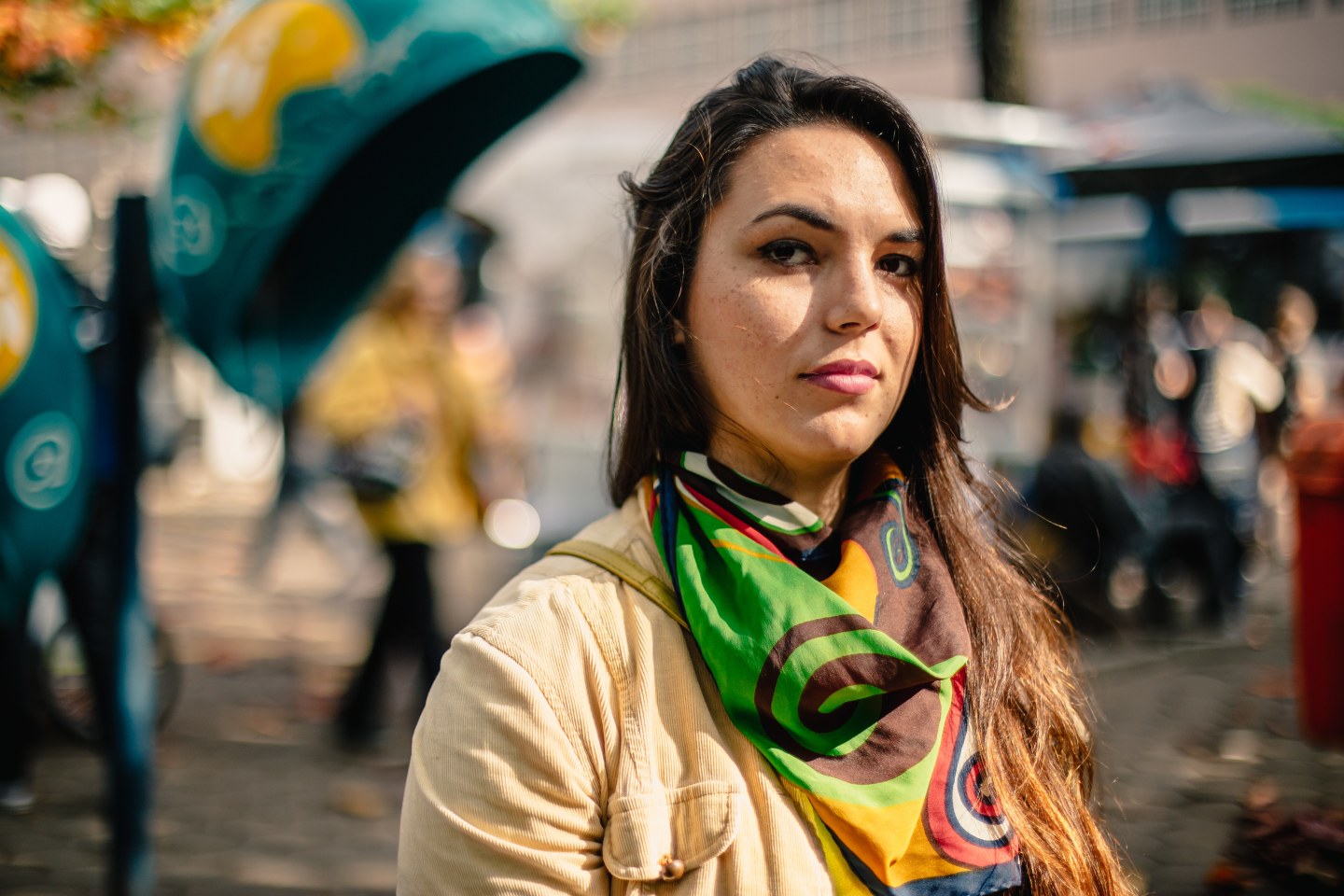5 Young Brazilians Explain The Real Cost Of The Olympics
Young people in Rio open up about how the Games have affected their city, and what they mean for the future.
 Thiago Silva
Thiago Silva
Brazil is often referred to as “the country of the future.” In some ways, it’s a valid title. The nation is, famously, not defined by a single identity, being one of the most ethnically diverse in the world. Its landmass nearly blankets all of South America, offering vast economic potential from its resource-rich lands. And its culture seems to reflect that versatility, with a people often characterized by resilience, upbeat pride, and a love for their country.
So on the surface, this vision of the future doesn’t seem half bad — especially in light of Brazil’s past. From 1964 to 1985, a military dictatorship controlled of the nation, and this period was followed by over a decade of mismanagement and corruption. But then, the new millennium ushered in one of the greatest economic booms Brazil had ever experienced, lifting millions out of poverty, and transforming the nation into an international force to be reckoned with. By 2009, the year it had won its bid for the 2016 Olympics in Rio de Janeiro, Brazil was a global success story.
But today, the country doesn’t feel too much like the future. At least, not a future that most folks might want to be a part of. A corruption scandal, otherwise known as Operation Lava Jato (or “Car Wash”), has landed 49 politicians under investigation for alleged kickbacks and bribery from the country’s oil titan, Petrobras. After what some consider a “coup,” Brazil’s first woman president, Dilma Rousseff, was recently impeached on charges of budget manipulation. The country now finds itself in the worst economic downturn since the Great Depression, and the majority of Brazilians are now calling for new elections.
Against this backdrop, it’s not surprising a recent poll found that nearly half of Brazilians said they were not looking forward to the Olympics. Protests are already underway ahead of Rousseff’s impeachment trial, which begins just after the Games end. Meanwhile, the morale in the “Marvelous City” — its token title, taken from a song about Rio’s beauty — is strikingly low, offset by grim headlines over Zika, last-minute problems with preparedness, terrorist threats, dangerous bacteria in Rio’s Guanabara Bay, and a spike in violent crime. Pre-Olympic projects, like the brand new metro line and tram, have also been derided as divisive, made for tourists rather than the cariocas who live here.
But perhaps one of the most visible signs of anger here are the youth-led protests that have broken out in response to massive cuts to the Ministry of Culture and Olympic programs made by Michel Temer, the new acting president. The highly unpopular politician has also further angered activists by selecting an all-white, all-male Cabinet. And now, in Rio, you’re just as likely to see the famous five rings of the Olympics as you are to hear young Brazilians chant “Fora Temer” [“Temer, Get Out”] in bars, clubs and on the street, which doubles as call for the acting president to leave office, and a plea for change.
Knowing all of this, we wanted to hear directly from the youth of Brazil. So we set out on the streets of Rio to find out how the Olympics have affected their home in these uncertain times, what the Games might mean for the years ahead, and how Brazil might start feeling again like “the country of the future.” They had a lot to say.
1. Debora Luisa Freitas da Silva, 26

I'm in love with volleyball, and so the Olympics always seemed like a dream to me. But I'm not going to be able to go, because on top of the tickets being so expensive, a lot of them are sold to tourist agencies and it becomes inaccessible to us.
At this point, [the Games] are the biggest failure that could happen. I'm not seeing any benefits for the residents of Rio, specifically those on the outskirts who need public services. It's very frustrating.
I live in the Baixada Fluminense region, which is so close to Rio — but it's as if we don't make up part of the city. It's not that we're against the Olympics, but because of the type of politics that have occurred, and the people who need emergency services who aren’t getting them, it has created a critical sense amongst us. We're only seeing motives driven by money, when we need investment in security, education, and healthcare. So for us, from the metropolitan region, the only thing the Olympics represent is chaos.
2. Guilherme Cabral, 28

Many of the projects that were built for the Olympics have displaced residents. Basic necessities have been sacrificed so that the event could happen, like healthcare and transportation. So it has generated a huge problem of public dissatisfaction that was already visible during the World Cup. Something so important, globally, is taking place in Rio de Janeiro, and it had everything to be symbolic, but that's exactly the opposite of what's happening now. It's not symbolic — it's frustrating.
We are the biggest, young democracy. Consider the fact that, in recent memory, there was a very long military dictatorship here which oversaw society in a very conservative way. So, in terms of corruption, it's very hard to determine where corruption started in Brazil.
I was in the United States in April last year for a conference at Duke University. At the time, the riots in Ferguson had happened about a year before. So I learned a lot more on the topic of police brutality, which is also a huge topic here in Brazil. My whole family is black, and in Brazil, even though we’re 50 percent of the population here, we still have the highest number of daily deaths and homicides. We're sometimes talking about kids that are seven or eight years old. We're talking about children. Not even Syria, Iraq, or Afghanistan have numbers like we have.
The black population in Brazil lives in a state of calamity. We have this sense here that human rights are not universal, but something of privilege, which is ridiculous. And the military police [here] think they don’t have to respect human rights. We have one of the few urban police in the entire world that carry high-caliber automatic weapons on the streets. And because this person thinks he makes up the armed part of the state, he gets to decide who lives and who dies. There are propositions to demilitarize the police here, but because they're military police, they go through a completely different judicial process than the civilian police. Today, on social media, though, we have a greater visibility, globally, so we have a way to make an impact.
“We’re only seeing motives driven by money, when we need investment in security, education, and healthcare.” —Debora Luisa Freitas da Silva
3. Thiago Silva, 18

I think it’s going to be a good event, like the World Cup, which everyone liked. Before the Olympics, there were also huge changes, in terms of infrastructure and the bus system here. The airport improved, and the city completely changed. Only three years ago, everything in this city was so old, and there wasn't anything like what there is now.
I think that Brazil could have been a much less developed country than it is today, considering the level of corruption that exists. I can't wait until the Olympics arrive, and everyone will be able to root for their country. I think cariocas are very much like this — they also receive tourists very well, too, which will make these Olympics great. I don't like to think negatively. I always think positively, despite how bad things might be. The country is going to get better, starting from here.
4. Pablo Lamar, 27

The mood [here] isn't good; people are worried. For instance, after the threat with the Islamic State that happened recently—there was a backpack left unattended, and everyone thought it was a bomb. But in terms of the Games themselves, I think people are excited about the events and entertainment in the upcoming month, almost like during the World Cup two years ago.
I think the politicians have woken up now. There were eight years of a lot of stealing, but now there’s more of an awareness of corruption. I think the stealing is going to diminish from here on out. I think even those of the highest rank are falling now. After that, it could get a lot better. And once all of this calms down with the Olympics, then the country will return back to reality, prices will lower a bit, and slowly, the country will improve.
“The black population in Brazil lives in a state of calamity. We have this sense here that human rights are not universal, but something of privilege.” —Guilherme Cabral
5. Izabela Vitória Silvério de Souza, 18

I think we're not prepared [for the Olympics]. We had a lot of time to prepare, to give the right money to the Games, but we didn't. It's horrible. But since it's happening, I hope for the best. I really do. We're very friendly, so I think the tourists will like us, but everything with the violence is a big problem for me.
I would like to see the Lagoa and Guanabara Bay cleaned up, since they’re so polluted and smell horrible. And I would like to see a more fair system in Rio, because the state is broken, and there isn't money for anything. I would like to see some kind of economic team that would be able to divide up the costs correctly, and pay the teachers and the police, who aren't being paid. That's what I would like to see, much more than any stadium or anything else one could build.
I really hope for a better country, one with less corruption. I can't stand it anymore. How can they steal so much money and sleep well at night? Luckily, because of the media, we're getting exposed to everything that's happening. I'm going to study law here to see if I can make some kind of difference. I believe in the justice system, despite how antiquated it might seem here in Brazil. This new generation is also more aware, and I have a lot of hope in that. I think a better future is coming.